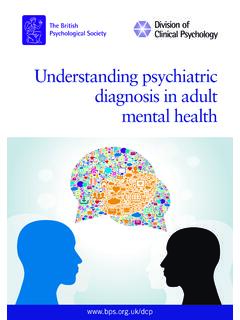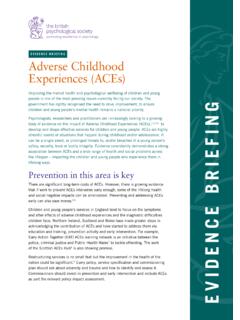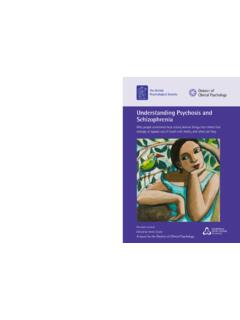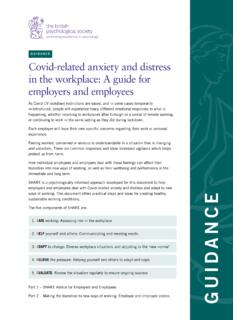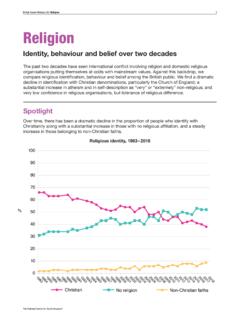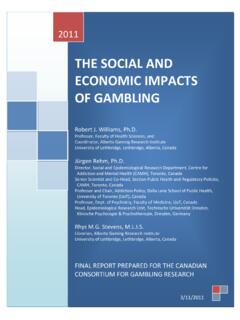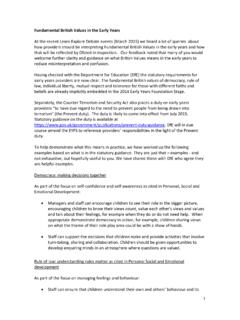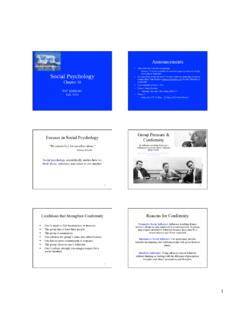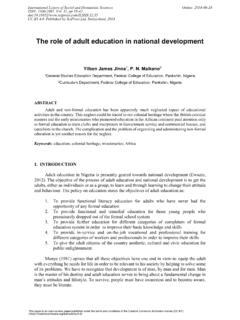Transcription of Going green: The psychology of sustainability in the workplace
1 Going Green: The psychology of sustainability in the workplace Edited by Dean Bartlett, London Metropolitan University February 2011. Contents Chapter Page 1 Introduction: The psychology of sustainability in the workplace 1. Dean Bartlett, London Metropolitan Business School 2 Green recruitment, development and engagement 6. Anna Kane, Ampleo. 3 Greening your organisation: The case of the Environment Agency 18. Julian Feasby and Karen Wells, The Environment Agency 4 Green buildings: Understanding the role of end user behaviour 31. Mindy Hadi & Chloe Halfhide, BRE. 5 Green organisational performance: Behavioural change interventions 36. based on the theory of planned behaviour Richard Parker, Boots Opticians 6 Green behaviour: Barriers, facilitators and the role of attributions 47.
2 Richard Plank, City University. 7 Green behaviour: Differences in recycling behaviour between the 59. home and the workplace Seonaidh McDonald, Robert Gordon University 8 Green behaviour change: HOT topics 65. Mike Page and Nadine Page, University of Hertfordshire 9 Green behaviour change: A case study of Eco Concierge 76. Karen Anderton and Kirsten Jack, Eco Concierge. 10 Promoting environmental behaviour in the workplace : 84. A survey of UK organisations Lara Zibarras & Catrin Ballinger, City University If you have problems reading this document and would like it in a different format, please contact us with your specific requirements. Tel: 0116 252 9523; E-mail: INF183 03/2011 ISBN 978-1-85433-713-9. Printed and published by the british Psychological Society.
3 The british Psychological Society 2011. The british Psychological Society St Andrews House, 48 Princess Road East, Leicester LE1 7DR, UK. Telephone 0116 254 9568 Facsimile 0116 247 0787. E-mail Website Incorporated by Royal Charter Registered Charity No 229642. Introduction Dean Bartlett, London Metropolitan University This report draws together a range of research and case studies which were developed as part of the british Psychological Society's Division of Occupational psychology Going Green Symposium held in London in 2010. Its aim is to provide an illustration of the important contribution that the field of work and organisational psychology can make to understanding and promoting green behaviour in the workplace .
4 This first introductory chapter outlines what is in the other chapters, reflecting on their key messages and summarising some of the issues which they individually and collectively raise. The report contains a range of useful material for people specialists' in organisations, including a number of vignettes and case studies particularly aimed at practitioners, alongside the sorts of theoretical material and research results you would expect from the specialist area of occupational psychology which applies the science of psychology to the workplace . The green organisational imperative The issue of climate change and environmental sustainability is one which has become central for organisations during the past decade.
5 Numerous arguments have been advanced as to why organisations should become more environmentally friendly; however, despite widespread acceptance of this green imperative, progress remains slow. Whilst considerable debate continues to rage over the relative influence of innovative new green technology and the respective roles of governments, international bodies and private and public sector organisations, the simple fact is that, in the final analysis, Going green comes down to individual behaviour. We all have a part to play and the role of organisations will necessarily be enacted through the people that work in and for them. The second paper in this collection therefore starts by considering how organisations can recruit staff to do their jobs in an environmentally friendly way.
6 Drawing on theoretical approaches to motivation and work engagement, it argues that a strategic approach is needed which integrates system-wide influences upon not only the recruitment of staff, but also their subsequent development and the way in which jobs must be redesigned to achieve greener performance and better rewards for both the employee and the organisation. One of the key contributions that psychology can make to the greening agenda lies in what it has to say about the behaviour of individuals and how organisations can facilitate behaviour change towards greener alternatives. The third paper in the report paints a particularly fascinating picture of how an organisation consisting largely of environmental specialists the Environment Agency has improved its own environmental performance.
7 It provides a revealing account of how to influence the behaviour of the workforce and contains a number of impressive examples of good environmental practice, along with some practical lessons about how to achieve them which are sure to be of interest for other The psychology of sustainability in the workplace 1. organisations in their attempts to green their operations. These papers highlight the importance of really engaging staff in order to harness their contribution a key principle underlying effective practice in this area which is emphasised in numerous other contributions to this report and which must, therefore, be one of the overall key take-home messages that readers can take back to their own organisations and apply, perhaps by following some of the examples outlined herein.
8 Adjusting to new ways of working Of course, changing individuals' behaviour within existing organisational systems and processes is only one element of the puzzle which we must solve if we are to overcome the problem of sustainability . A further piece of that puzzle comes from green technology. The argument has been based by many commentators on a premise that the old' way of doing things in contemporary organisations, which are part of our existing, carbon-intensive economy, is not sustainable and therefore creative green innovations are needed in order to work out new ways of living in a post-carbon economy of the future. What can the psychology of workplace behaviour contribute to our understanding of how individuals adjust to these types of eco-innovations'?
9 The fourth paper in the report addresses this very topic by examining the role of user behaviour in low-carbon' green buildings. Based upon research from the BRE Building Design Consultancy, it provides a number of fascinating insights into how end-users of this technology adapt to such innovations in the workplace and how we can model the influence of their behaviour upon the effectiveness of such products. It shows that individuals will adapt and even sabotage technology aimed at greening the operations of an organisation to suit their needs. Such technology needs, therefore, to take full account of the role of end-user behaviour in its design if it is to achieve its desired objective of improved efficiency and lowered energy use.
10 As the pace of eco-innovation shifts from an incremental, responsive mode where it can be thought of a reaction to inefficiencies which take place within existing technological, social , organisational and cultural milieu, the role of such insights from psychology will become essential in developing a more strategic approach to the larger scale transformation of organisations. Green work performance In one sense, then, Going green in the workplace is about developing particular interventions which are aimed at improving green organisational performance and the fifth and sixth papers in this volume look at how this can be achieved through psychological means based on two very well-established psychological literatures.

